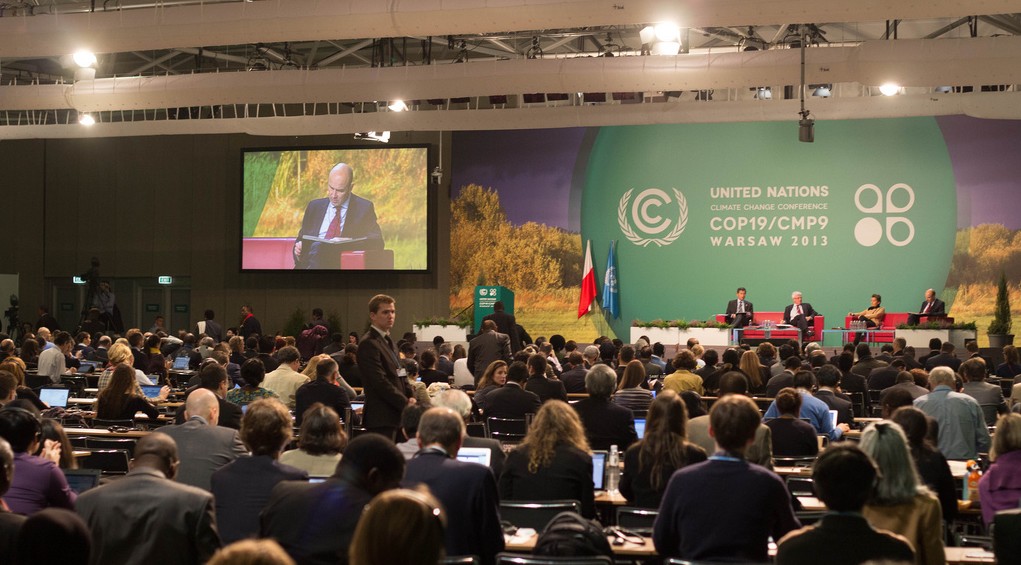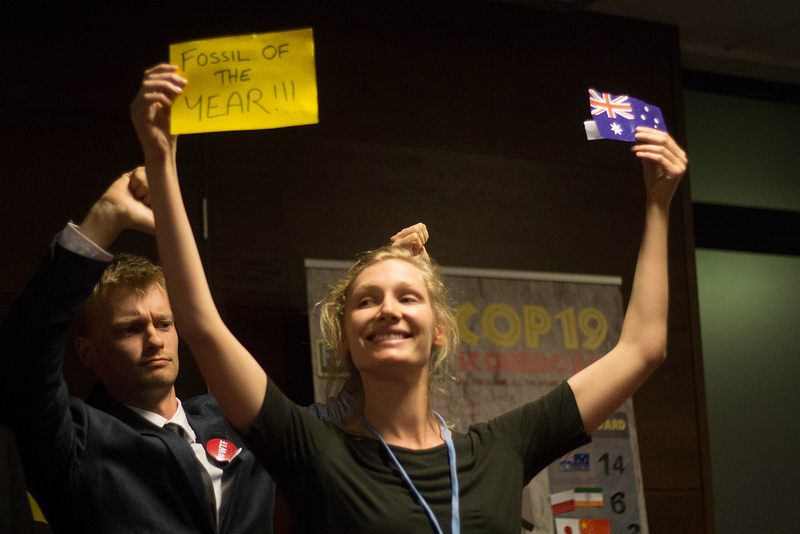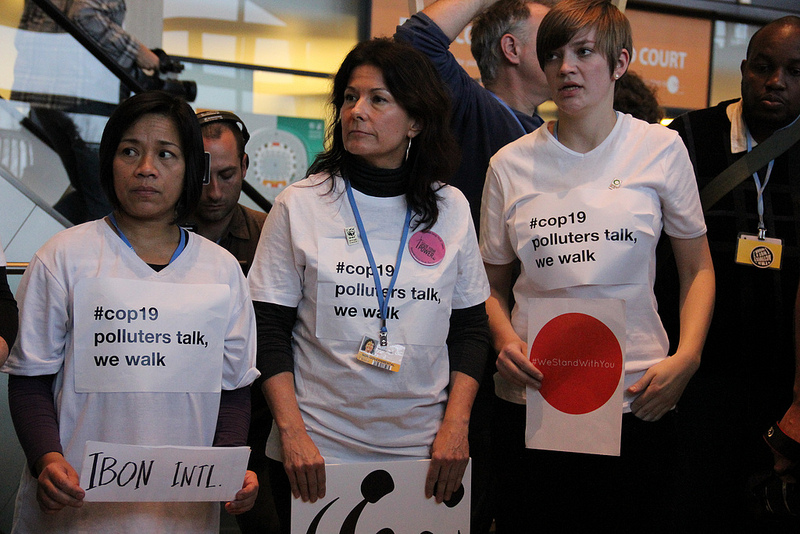No one knows when this madness will get over!
WARSAW, November 22/ 11:45PM (CET): The National Stadium went alive today with hundreds of people chanting aloud ‘Stop climate madness’ as the ongoing UN climate change conference draws to a close with the high-level ministerial segment. It seems like this year’s meeting too has produced few tangible deliverables and only served as an exercise in reiterated rhetoric. This is despite the fact that the 19th session of the Conference of Parties was held against the backdrop of super typhoon Haiyan which flattened out large parts of the Philippines and is only the latest in a series of extreme weather conditions around the world that have threatened the lives and livelihoods of millions. Though the devastation of Haiyan is still fresh in public memory, world leaders were not motivated to raise their commitment to the cause of controlling climate change.
The developed world, especially, failed to rise to the occasion once again, with some countries lowering their carbon emission reduction targets. Japan, for instance, has said that not only were the previous targets too high, they are now entirely unrealistic because, in the aftermath of the Fukushima accident, the country has had to give up on nuclear energy and return to fossil fuels. India’s Union Minister for Environment and Forests Jayanthi Natarajan echoed the sentiments of the developing world when she expressed her dismay at this “scaling down of ambition” and warned that “the world cannot afford to give up the momentum at this point”. She also rightly pointed out that developing countries had pledged more than their developed counterparts even though it is the latter who are supposed to take the lead.
According to the principle of Common but Differentiated Responsibility, all countries will reduce carbon emissions but some more than others. Developed countries are to cut more as they produce more, and also because, having already made significant economic progress, they can afford to scale back. Developing countries, on the other hand, including India and China which are emerging as major carbon emitters, can’t do so, as drastically, as it will hurt their growth.
Also, developing countries do not have the resources to switch to more eco-friendly processes, and here too the developed world has refused to chip in —as the empty coffers of the Green Climate Fund prove. In fact, critical negotiations on Loss and Damage mechanism briefly broke down after members of G77+China (a developing world grouping that includes India) walked out on at wee hours on Wednesday here a rare display of displeasure in international diplomacy. Such a walk out has not been witnessed in the climate negotiations for nearly a decade. They had proposed that developed countries help with money and technology to compensate for the damages suffered due to climate change, but countries such as Australia and Norway refused to commit to a fixed liabilities code, fearing that it would push them into a bottomless money trap. The latter say that it is not possible to determine if particular natural disasters happened due to climate change phenomenon but this is a specious argument, meant to cover-up their historical burden.
Ms Jayanthi Natarjan supported the G77 walk out of talks on Loss and Damage. “We totally agree with the G77 position. This is a very weak draft and we totally support the walk out. It is an extremely diluted and shows absolutely no commitment to the loss and damage. This is not something that we can accept. We are part of the G77,” she said.
Loss and damage refers to the demand from the poor and vulnerable countries demanding that they be paid reparation for the inevitable damage from climate change that no amount of adaptation or reducing emissions can prevent.
A decision was taken at last year’s talks in Doha to set up a mechanism to address loss and damage but this year the US, Norway, Australia have stood adamant against such a move trying to defang the subject believing that the language of liability and compensation should not be allowed into climate change negotiations. They demanded it be relegated to just a body under the existing adaptation institutions diluting its significance.
Although after a long contentious debate the Parties have reached upon an agreement that a mechanism on loss and damage would be housed under the UN climate convention’s set of institutions, the consensus on where and how it would be financed — under the Adaptation committee or separate — still remained unresolved.
Ms Natarajan also explained the Indian position stating that as a short-term measure India supported creating a window under the existing Green Climate Fund to provide quick resources for loss and damage but in the long run India too was with the rest of the G77+ China countries to ask for a separate mechanism apart from the ‘adaptation’ mechanisms under the UN climate convention.
The climate talks here at Warsaw was heading to such an empty-shell outcome that yesterday (November 21) over 800 representatives of NGOs staged a voluntary walk-out from the conference venue at the National Stadium, in a rare sign of frustration and solidarity, citing lack of commitment from developed countries and take over by corporate interests. The environmental NGOs have always been an integral part of the climate negotiations and are allowed to not only sit in and watch the negotiations but also intervene, at times, with their demands.
“How many more years should we wait while people face the fury of climate change now? Climate talks in Warsaw are supposed to create solutions to deal with increasing typhoons, rising seas and dying species. Instead of leading at these talks, rich countries are back-tracking, blocking and taking U-turns. This has become the norm and this must change,” said Harjeet Singh from ActionAid International before joining the walkout.
On a third track, negotiations have been dragging for three days with the rich countries trying to break the firewall between the developed and the developing countries and hence going back on on their commitments to fight climate change.
Ms Natarjan has said, “It is a matter of deep concern to my country that there has been absolutely no progress in any of the issues of interest to developing countries in this Conference of Parties. Discussions on crucial issues of direct importance to developing countries like finance, technology and Loss and Damage have remained deadlocked due to lack of will by developed country Parties.”
In a late night manoeuvre on November 21, the US pedalled back on its obligation to the promise of the $100 billion funds by 2020 for poor countries. It instead demanded that the developing countries too should be asked to contribute. The move by the US of inserting a new fundamental idea going against the decisions that have been taken in previous years at the UN climate negotiations left the G77 countries angry and made them officially register complaint against negotiations being conducted in bad faith.
One of the G77 negotiators walking out of the meeting said, “It was decided earlier that the $ 100 billion annually will be provided by the developed countries by 2020 to help the developing countries fight climate change. They agreed to it. Now they are slipping in the idea that developing countries should also contribute to this fund. Besides this they see private investments as a large part of the funds to begin with. This is plain and simple backtracking.”
The overnight meeting was suspended with the difference on finance remaining irresolvable between negotiators. A source said the contentious and bracketed text of the decision on the future of the Green Climate Fund (texts in brackets imply disagreement between countries on the content) will now be taken up between select ministers. It could not be confirmed if those confabulations had begun but negotiators from some key countries in the G77+ China block said that they had been informed of such high-level confabulations.
While ministers are able to thrash out compromises on such politically contentious issues at such times, the developing countries always fear that their ministerial leaders are at times unable to handle the intricacies and nuances of these high-level and intense negotiations leading to confusion.
“There is a huge ambition gap between what developed country have pledged and what is required by science and their historical responsibilities. The irony is that developing countries have pledged much more than developed countries in pre-2020 period,” Ms Natarajan has said.




Pingback: Developed world still won’t clean its mess! | avikroyblogs